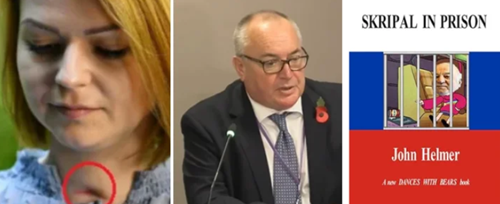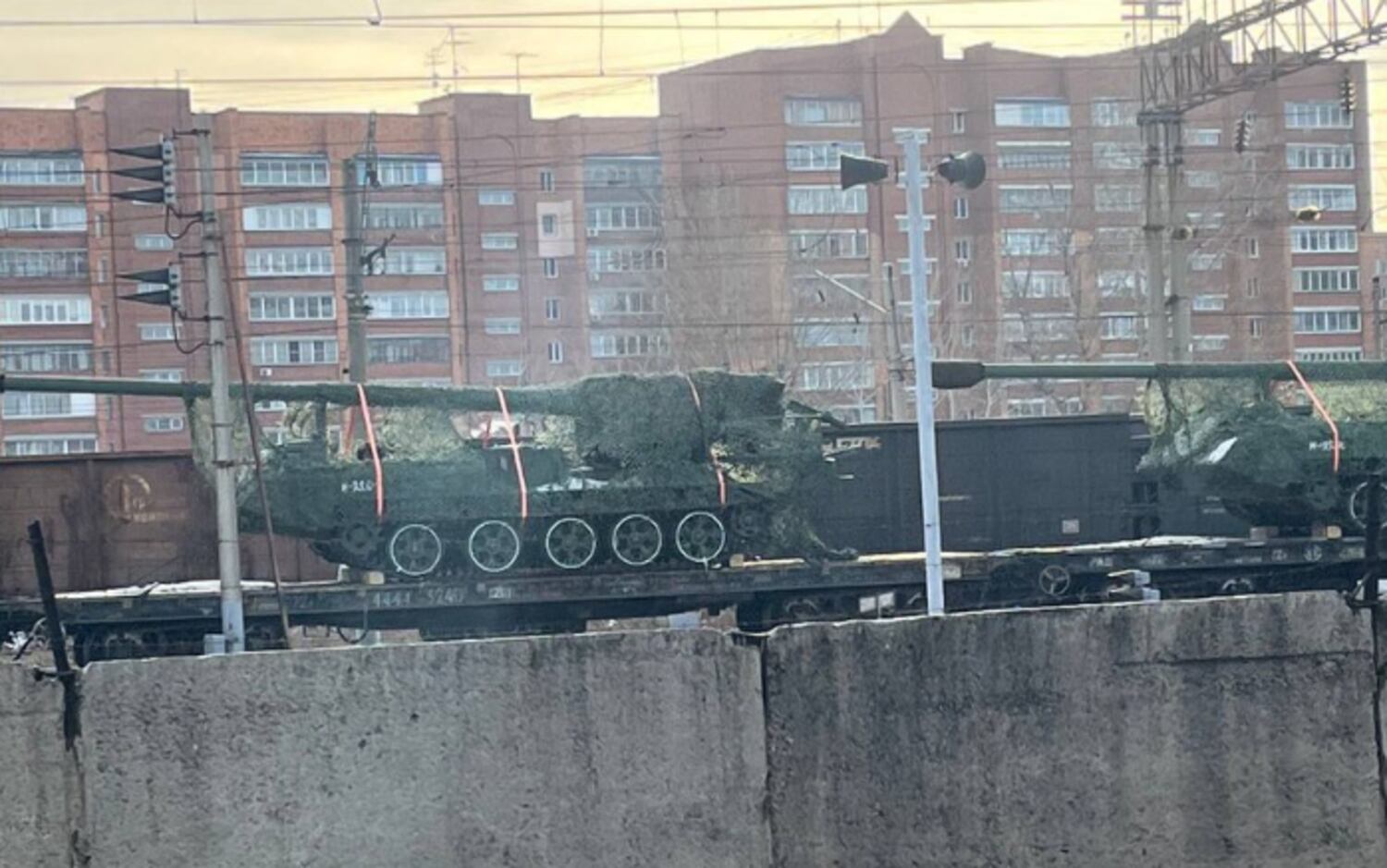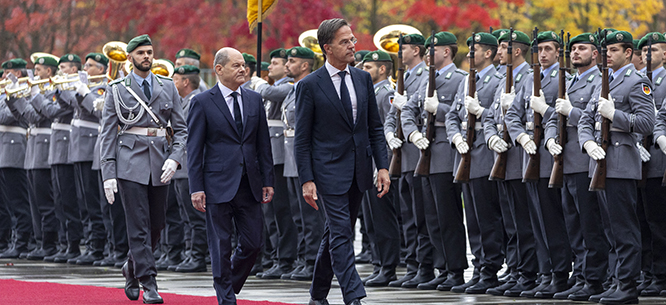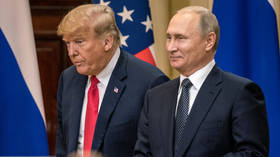President Vladimir Putin has announced that serial production of the new Oreshnik hypersonic, intermediate range, 36-warhead missile has commenced. He made this announcement at a special public meeting with Defense Ministry officials in the Kremlin on Friday, November 22.
“There are no means of countering such a missile; no means of intercepting it exist in the world today,” Putin said. “We need to launch its serial production. Let us assume that the decision on the serial production of this system has been made. As a matter of fact, it has already been essentially organised.”
This means there are already, or will shortly be deployed, dozens of Oreshniki missiles for firing at targets in the Ukraine west of the Dnieper River and as far west as the Polish and Hungarian borders.
This also means that no American, no NATO staff group, no Anglo-American target intelligence unit in bunkers in Kiev or Lvov are safe any longer. Nor are Vladimir Zelensky and his advisors. To escape Israeli-precedent decapitation, they must all decamp to the Ukrainian war operations mock-up already prepared on the Polish side of the border.
Ukrainian military intelligence head, Kirill Budanov, has claimed that the Oreshnik strike on the Yuzhmash (Pivdenmash) plant in Dniepropetrovsk is “just a cipher…We know for sure that as of October they were supposed to make two research samples, maybe they made a little bit more, but believe me, this is a research sample, but not yet serial production, thank God.”
“Wishful thinking,” a NATO military source comments. “He’ll get the chance to find out first- hand.”
Russian military sources add that, following disclosure of the Kremlin’s back-channel talks with Donald Trump and his advisors on terms for an end-of-war settlement, the Oreshnik is the signal that the “General Staff are talking directly to Trump & Co.” Putin was explicit in his first announcement of the Oreshnik firing: “We believe that the United States [President Trump] made a mistake by unilaterally destroying the INF Treaty in 2019 under a far-fetched pretext.”
Dmitry Rogozin — formerly Russian NATO ambassador, then deputy prime minister in charge of the Russian military industrial complex, now senator for Zaporozhye – carefully identified the credit for the Oreshnik: “Today, everyone who fought for the creation of this missile system, who overcame what we may call scepticism, should congratulate each other. And I join those congratulations. Good for you!…Thank you to the Supreme [Command, Верховному] for supporting the work! Thank you to the Academy for not backing away!”
A Russian source, who does not believe Putin ordered the General Staff to suspend its electric war campaign between August and this month, believes Russian strategy now is “a thousand cuts. The Oreshnik is a particularly deep one but I don’t believe that the Kremlin and General Staff have decided to use it to hit Bankova [street address in Kiev of the presidential offices and living quarters ]. The decapitation threat is real enough though to impel Zelensky to exit, or maybe for the Ukrainian military to get rid of him on their own initiative.”
“Just as important,” the source says, “the Russian ground offensive in the east will remain slow, patient, maybe for two years more. The priority is on preventing Russian casualties, conserving Russian lives. This is essential once you realize that the [Putin] presidential succession also depends, not only on winning the war on Russian terms, but ensuring the protection of Russian lives.”
Oreshnik in Russian means, literally, hazel nut or the wood of the hazelnut tree. In Siberia, the cognate expression “to give nuts” has the metaphorical meaning of inflicting punishment.

Watch and listen to this video recording of the sequence of warhead strikes on November 21. In this second videoclip, the unique funnel of light is displayed six times as the warheads land on target.
As Putin pointed out in his national address on the evening after the Oreshnik strike, it had been then-President Trump’s “mistake” in 2019 to unilaterally withdraw from the 1987 Soviet-American treaty on intermediate range nuclear forces (INF). Oreshnik is both the Russian reply and also a warning to Trump to correct his mistake.
For the time being, the Financial Times, a Japanese propaganda outlet in London, reported a Norwegian graduate student as claiming “there certainly was no military value to it.”
In Moscow, Izvestia, on which the BBC has relied for republication, reported “it is likely that we are dealing with a new generation of Russian intermediate-range missiles [with a range of] 2,500-3,000km (1,550-1,860 miles) and potentially extending to 5,000km (3,100 miles), but not intercontinental. It is obviously equipped with a separating warhead with individual guidance units.”
This means the missile is MIRV, comprising multiple independently targeted re-entry vehicles. Close observation of the strike videoclips shows six of these releasing six munitions capable of penetrating deep underground bunkers. A salvo of thirty-six warhead detonations, altogether.
Missile speed is reported to be between Mach 10 and Mach 11.

The Militarist military blog of Moscow reports this image of the predecessor RSD-10 Pioneer missile “can give a definite idea of the appearance of the Oreshnik.”
Although satellite images of the plant after Thursday’s attack have not been declassified or published in the open, what is likely is that the bunker stocks of ATACMS and Storm Shadow missiles being prepared at the plant for launching against Russia were destroyed, along with the factory-floor and machine capacities of the plant to service HIMARS, other rocket and missile firing equipment delivered by the US and NATO states to the Zelensky regime.
Russian military sources have been discussing Ukrainian target options since the Putin Pause ended on November 17, and the electric war recommenced with the General Staff’s 120-missile, 90-drone raid against Ukraine’s energy infrastructure across the country. For more on the Putin Pause, click to read this and this.

Source: https://johnhelmer.net/
The sources differ on whether the military initiative has now been delegated by Putin to the General Staff without the autumn restrictions, and whether the President has decided the Biden Administration’s escalation has Trump’s tacit endorsement in a calculated “escalate-to-deescalate” plan.
A Russian military source cautions against confusing Russia’s operational priorities now that Oreshnik has been unleashed, and the strategic priorities which haven’t changed. “Will the generals go for Zelensky and take out the whole illegitimate regime if another ATAMCS hits deep Russia? You bet. The Israelis have made it very easy for Putin. But I do not think the generals or the Security Council or all of the Duma care so much at the moment. Zelensky isn’t a priority because his own soldiers will do him in.”
“I also see there is no pause for Trump. No deference, no hidden messages, and no respite irrespective of what talks might or not be going on behind the scenes. This is a signal that the trust in Trump is near zero, and even less so for [Elon] Musk and the love fest the two of them have been displaying. There’s only one message Trump can give now to show his intention for an end of the war, and that’s to get Zelensky to announce elections by next March. That would signal the end of the neo-Nazi regime, and of course, the end of Zelensky too.”
The military sources also emphasize the warnings to the US, its European and Asian allies in the small print of the new nuclear doctrine signed by Putin on November 19.

Source: https://rg.ru/documents/
Sputnik has published this “unofficial” translation into English.
The sources note that Paragraph 9 warns that nuclear deterrence is “directed against states that provide their controlled territory, airspace and/or maritime space and resources for the preparation and implementation of aggression against the Russian Federation.” Paragraph 11 then goes on to link nuclear with non-nuclear states in the NATO treaty, as well as the AUKUS and G7 blocs; in Asia these include Japan and Australia. “Aggression against the Russian Federation and/or its allies by any non-nuclear state with the participation or support of a nuclear state is considered as their joint attack.”
This is once again Putin’s cross-hairs warning to Poland and Romania for their US nuclear-capable Tomahawk missile bases at Redzikowo and Deveselu. The cross-hairs warning was first given by Putin in Greece in 2016. Now that the Greek government itself has agreed to secretly hosting US nuclear weapons at the Souda Bay base in Crete, the warning applies to Greece itself.
“Nuclear deterrence,” as Paragraph 12 of the Doctrine says, “is aimed at ensuring that a potential adversary understands the inevitability of retaliation in the event of aggression against the Russian Federation and/or its allies.” Greece, Spain, and Germany are also now targeted according to Paragraph 15(e) because they allow “the deployment of nuclear weapons and their means of delivery on the territories of non-nuclear states”; and according to Paragraph 15(g) because of the “actions of a potential enemy aimed at isolating part of the territory of the Russian Federation, including blocking access to vital transport communications”. In Europe this expands Russia’s targets to the Baltic states around Kaliningrad, as well as to the North Sea states Sweden, Norway and Denmark which participated in the Nord Stream-2 sabotage and now threaten Russian maritime movement through the Danish Straits.
Map of European Capitals within Range of Oreshnik (Kalingrad launch)

Source: https://t.me/readovkanews/89690
With an estimated 1,500 kgs of combat payload, lifting to a maximum height of 12 km and moving at a speed of Mach 10, the Oreshnik launched from Kaliningrad would strike Warsaw in 1 minute 21 seconds; Berlin, 2 min 35 sec; Paris, 6 min 52 sec; London, 6 min 56 sec.
Of direct impact for Russian strategy on the Ukrainian battlefield, the Doctrine provisions mean that Odessa will, in the words of a Moscow source, “never again be allowed to be a base against Russia.”
The Oreshnik strike of November 21, the military sources in Moscow believe, demonstrates the military capacity to strike with either conventional or nuclear warheads at targets throughout Europe which none of the available US Patriot or other western air defence systems can defend against. It creates a conventional alternative to nuclear retaliation if, as Paragraph 19(d) of the Doctrine says, there is “aggression against the Russian Federation and/or the Republic of Belarus as members of the Union State with the use of conventional weapons, creating a critical threat to their sovereignty and/or territorial integrity” (emphasis added).
Before Oreshnik, the Russians point out, Washington was saying there was nothing new in Putin’s nuclear doctrine paper. “Observing no changes to Russia’s nuclear posture, we have not seen any reason to adjust our own nuclear posture or doctrine in response to Russia’s statements today,” Reuters reported the National Security Council as saying on November 19.
After Oreshnik, in presentations at a Washington think tank on November 21, Pentagon officials announced: “adjustments to the 2022 Nuclear Posture Review may be required to sustain the ability to achieve nuclear deterrence, in light of enhanced nuclear capabilities of China and Russia and possible lack of nuclear arms control agreements after February.”

The President with the Defense Minister and other officials at the Kremlin on November 22.
Source: http://en.kremlin.ru/
Look carefully again at what Putin has announced for Oreshnik. By saying on November 21 “we also carried out tests of one of Russia’s latest medium-range missile systems,” he implied that the Yuzhmash strike may be a one-off. That depends, he added: “our decision on further deployment of intermediate-range and shorter-range missiles will depend on the actions of the United States and its satellites. We will determine the targets during further tests of our advanced missile systems based on the threats to the security of the Russian Federation.”
If the US adds to or refills the Kiev regime’s stocks of ATACMS; if the Starmer Government authorizes a new Storm Shadow firing across the border; likewise for President Emmanuel Macron for the SCALP missile, and for German Chancellor Olaf Scholz for the supply of Taurus missiles, then Putin’s warning on November 22 of serial production of Oreshniki has confirmed “inevitable retaliation”.
“As I have already said, we will continue these tests, including in combat conditions, depending on the situation and the nature of the security threats posed to Russia. All the more so as we have a stockpile of such products, a reserve of such systems ready for use.”
The post The Ukraine War after the Penny Has Dropped Make that the Oreshnik first appeared on Dissident Voice.This post was originally published on Dissident Voice.







